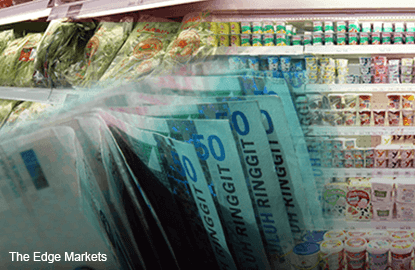
This article first appeared in The Edge Financial Daily, on April 21, 2016.
KUALA LUMPUR: Inflation in Malaysia, measured by the consumer price index (CPI), is expected to trend higher in April due to the hike in petrol prices under the managed float pricing mechanism.
According to data released by the Department of Statistics yesterday, Malaysia’s CPI for March increased at a slower pace of 2.6% to 113.8, compared with 110.9 in March last year.
Among the major groups that recorded increases were the indices for alcoholic beverages and tobacco (22.7%); miscellaneous goods and services (5.1%); food and non-alcoholic beverages (5%); furnishing, household equipment and routine household maintenance (4.7%); restaurants and hotels (4.5%); and health (4.2%).
In addition, the overall index was influenced by the decrease in the transport group by 8.2%.
Compared with February, the CPI for March decreased 0.6%, while for the first three months of this year, the index registered an increase of 3.4% compared with the same period last year.
JF Apex Securities Research said that it foresees CPI growing moderately by 2.7% year-on-year (y-o-y) in April, underpinned by continuous growth in its main products including food, alcoholic beverages and tobacco, housing, water, electricity, gas and other fuels.
“In addition, we reckon the transport index will slightly recover by next month amid the upward adjustment of domestic fuel costs in April 2016 after the prices of both RON95 and RON97 petrol were increased by 10 sen to RM1.70 and RM2.05 respectively and diesel at RM1.55 (up 20 sen) based on the managed float mechanism,” the research firm said in a note to clients yesterday.
UOB Malaysia economist Julia Goh projects a higher average inflation of 3.2% in 2016.
However, she added that this projection would be subject to a downward revision if oil price weakness persists, and domestic demand moderates further.
“Petrol prices were raised by 5.1% to 14.8% in April, the first increase since October last year. Despite the recent strengthening of the ringgit, most products have seen upward price adjustments due to a lag effect from last year’s currency weakness,” she said in an email response to The Edge Financial Daily.
Affin Hwang Capital Research chief economist Alan Tan opined that inflation should normalise to current levels moving forward, from a high of 3.4% in the first quarter of 2016.
“This is partly due to the normalisation of the goods and services tax on headline inflation from April.
“Barring any significant increase in global oil prices on domestic retail petrol prices, inflation may moderate and trend around 2.5% levels throughout 2016,” Tan told The Edge Financial Daily.
Meanwhile, JF Apex also noted that the alcoholic and tobacco component recorded another resilient performance in March 2016, expanding 22.7% y-o-y.
“The component maintained its double-digit growth this month backed by higher cigarette prices by tobacco companies on account of an increase in excise duties,” said the firm.